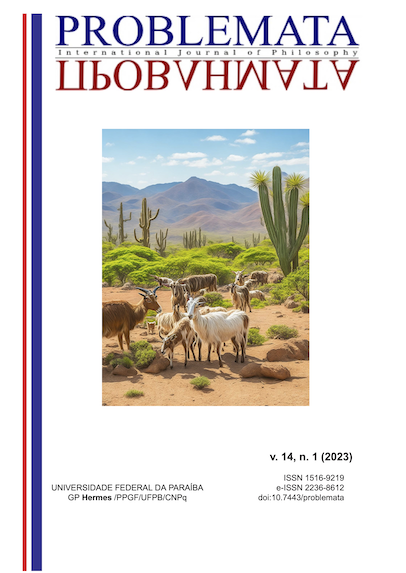PHILOSOPHY OF TECHNOLOGY:
INSTRUMENTAL REASON, RESPONSIBILITY PRINCIPLE AND THE DIGITAL WORLD
DOI:
https://doi.org/10.7443/problemata.v14i1.65102Keywords:
Philosophy, Technology, Ethic, Instrumental Reason, Instrumental Reason. Digital worldAbstract
The philosophy is a creation of human genius that seeks to know the complexity of the reality of things in a profound, radical way and as a whole. Gilles Deleuze and Félix Guattari (1992) state that if philosophy were considered a science, it would be the science of creating concepts. From this perspective, it is an activity of systematized thinking that seeks to conceptually reflect on the demands of reality in order to know the causes of the problems that surround it. Thus, this article seeks to reflect on the problem of technique and technology related to the concept of instrumental reason, created by Theodor Adorno and Max Horkheimer. The ethical question that surrounds this problem will be connected with the concept of responsibility principle, thought and elaborated by the philosopher Hans Jonas. The expression “digital world” is something very current and basically concerns the use and insertion of digital technologies in people's daily lives. The methodology used is the bibliographic review in which we perform an intertwining of three elements: instrumental reason, principle of responsibility and digital world, whose effort is to dialogue about the technological instrumental reason in the contemporary world.
Downloads
References
ADORNO, Theodor W. e HORKHEIMER, Max. Dialética do Esclarecimento: Fragmentos Filosóficos. Trad. Guido Antonio de Almeida. Rio de Janeiro: Jorge Zahar Editor, 1985.
ALMEIDA, Lenildes Ribeiro Silva. A Produção do conhecimento segundo a Razão Instrumental. Fragmentos de Cultura, Goiânia, v. 17, n. 9/10, p. 881-891, set./out. 2007. Disponível em <http://seer.pucgoias.edu.br/index.php/fragmentos/article/view/474/394> Acesso em: 06. nov. 2022.
ALMEIDA, Maureci Moreira de e RODRIGUES, Francisco Xavier Freire. Aufklärung, identidade e modernidade no mundo globalizado. Disponível em <https://periodicos.ufpb.br/index.php/problemata/article/view/22006> Acesso em: 21. nov. 2022.
ANTUNES, Deborah Christina. Da crítica Imanente à Razão Instrumental a um modo crítico de Ciências nas Humanidades: Algumas ideias da Escola de Frankfurt. Kalagatos – Revista de Filosofia. Fortaleza, CE, v. 6, N 12, 2009. Disponível em < https://www.revistas.uece.br/index.php/kalagatos/article/view/5953> Acesso em: 28. out. 2022.
BACON, Francis. Novum Organum. Os Pensadores. São Paulo: Abril Cultural, 1971.
BINGEMER, Maria Clara Lucchetti. Apresentação. In: JONAS, Hans. O Princípio responsabilidade: ensaio de uma ética para a civilização tecnológica. Rio de Janeiro: Contraponto, 2006.
CUPANI, Alberto filosofia da tecnologia: um convite. 3. ed. – Florianópolis: Editora da UFSC, 2016.
DETTONI, Josenir Lopes e BARBA, Clarides Henrich de. Tecnologia, ética e meio ambiente em Hans Jonas: um olhar responsável para o futuro. Disponível em<https://redib.org/Record/oai_articulo2991719-tecnologia-%C3%A9tica-e-meio-ambiente-em-hans-jonas-um-olhar-respons%C3%A1vel-para-o-futuro#> Acesso em: 26. Out. 2022.
GILLES, Deleuze e GUATTARI, Félix. O que é a filosofia? Rio de Janeiro: Ed. 34, 1992
GUIMARÃES, Nathalia Muylaert Locks. A possibilidade de uma transformação social em Horkheimer: da teoria crítica à crítica da razão instrumental. São Paulo: UFCar, 2011. (Dissertação de mestrado)
HORKHEIMER, Max. Eclipse da razão. São Paulo: Centauro, 2002.
IHDE, Don. Tecnologia e o mundo da vida: do jardim à terra. Trad. Maurício Fernando Bozatski. Chapecó: Ed. Universidade Federal Fronteira Sul, 2017.
JONAS, Hans. O Princípio responsabilidade: ensaio de uma ética para a civilização tecnológica. Rio de Janeiro: Contraponto, 2006.
LEMOS, André. A tecnologia é um vírus: pandemia e cultura digital. Porto Alegre: Sulina, 2021.
Downloads
Published
Issue
Section
License
Copyright (c) 2023 Maureci Moreira de Almeida; Luceni da Silva Oliveira

This work is licensed under a Creative Commons Attribution 4.0 International License.
Authors who publish with this journal agree to the following terms:
- Authors retain copyright and grant the journal right of first publication with the work simultaneously licensed under a Creative Commons Attribution License that allows others to share the work with an acknowledgement of the work's authorship and initial publication in this journal.
- Authors are able to enter into separate, additional contractual arrangements for the non-exclusive distribution of the journal's published version of the work (e.g., post it to an institutional repository or publish it in a book), with an acknowledgement of its initial publication in this journal.
-
- Authors are permitted and encouraged to post their work online (e.g., in institutional repositories or on their website) prior to and during the submission process, as it can lead to productive exchanges, as well as earlier and greater citation of published work (See The Effect of Open Access).





